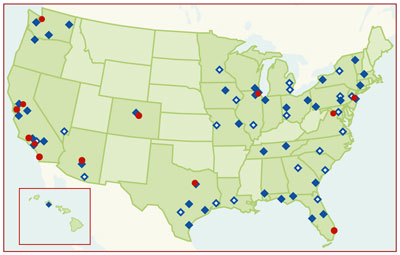|
MoldReport™
Toll Free: 800.224.1527
Email: [email protected]
Mold Lab Locations

Information & Forms
for Mold Inspectors
Chain of Custody (pdf)
How To Submit Mold Samples
Mold Sampling FAQ's
Buy Sampling Supplies (offsite)
Log-in to LabServe™ (offsite)
For the Home Owner
Find a Mold Inspector
Real Estate News (offsite)
Inspection News (offsite)
Mold Resources
Mold Basics
Mold Allergies
Mold Information
|
No Hype, Just Facts.
WHY IS MOLD GROWING IN MY HOME?
Molds are part of the natural environment. Outdoors, molds
play a part in nature by breaking down dead organic
matter such as fallen leaves and dead trees, but indoors,
mold growth should be avoided. Molds reproduce by means
of tiny spores; the spores are invisible to the naked
eye and float through outdoor and indoor air. Mold
may begin growing indoors when mold spores land on
surfaces that are wet. There are many types of mold,
and none of them will grow without water or moisture.
CAN MOLD CAUSE HEALTH PROBLEMS?
Molds are usually not a problem indoors, unless there is
a source of mold spores in an area where aerosolitation
and human exposure can occur. Molds have the potential
to cause health problems. Molds produce allergens (substances
that can cause allergic reactions), irritants, and
in some cases, potentially toxic substances (mycotoxins).
Allergic responses include hay fever-type symptoms,
such as sneezing, runny nose, red eyes, and skin rash
(dermatitis). Allergic reactions to mold are common.
They can be immediate or delayed. Molds can also cause
asthma attacks in people with asthma who are allergic
to mold. Research on mold and health effects is ongoing.
This provides a brief overview; it does not describe
all potential health effects related to mold exposure.
For more detailed information consult a health professional.
You may also wish to consult your state or local health
department.
HOW DO I GET RID OF MOLD?
It is impossible to get rid of all mold and mold spores
indoors; some mold spores will be found floating through
the air and in house dust. The mold spores will not
grow if moisture is not present. Indoor mold growth
can and should be prevented or controlled by controlling
moisture indoors. If there is mold growth in your home,
you must clean up the mold and fix the water problem.
If you clean up the mold, but don't fix the water problem,
then, most likely, the mold problem will come back.
Source: Environmental Protection Agency
HOW DO I FIND A MOLD INSPECTOR?
Please review our Find a Mold Inspector page. You can also contact
your local Department of Health agency or contact us for a referral.
|






